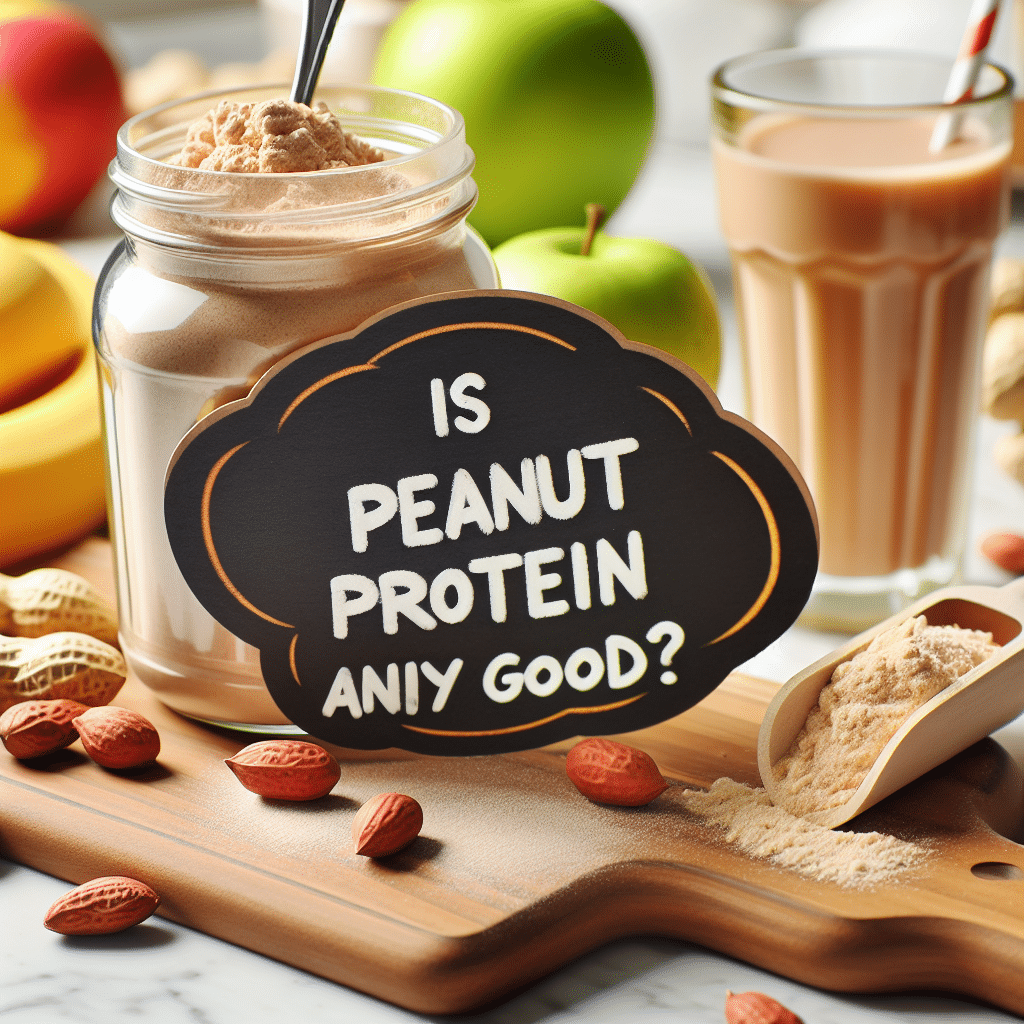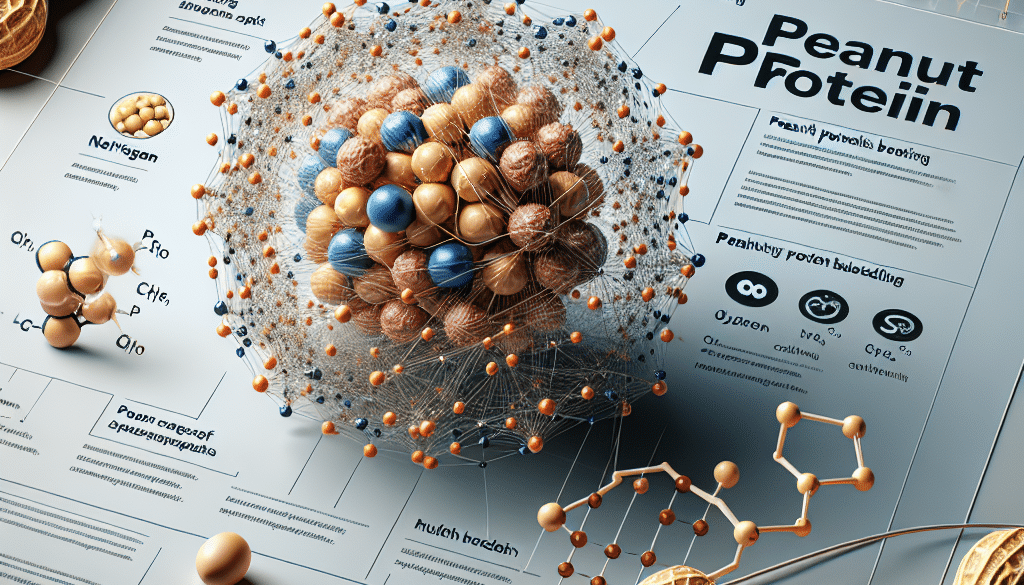Is Peanut Protein Any Good?
-
Table of Contents
- Peanut Protein: A Nutritional Powerhouse or Just Hype?
- Understanding Peanut Protein
- Nutritional Benefits of Peanut Protein
- Comparing Peanut Protein to Other Plant Proteins
- Potential Drawbacks of Peanut Protein
- Practical Uses of Peanut Protein
- Case Studies and Research
- Conclusion: Is Peanut Protein Worth Considering?
- Discover ETprotein’s High-Quality Peanut Protein Products
Peanut Protein: A Nutritional Powerhouse or Just Hype?

When it comes to protein sources, there’s a plethora of options available, ranging from animal-based proteins like whey and casein to plant-based alternatives such as soy, pea, and hemp. Among these, peanut protein is often overlooked, yet it presents a unique set of nutritional benefits that may make it a valuable addition to your diet. In this article, we’ll delve into the world of peanut protein, examining its nutritional profile, health benefits, and potential drawbacks to determine whether it’s a good choice for your nutritional needs.
Understanding Peanut Protein
Peanuts, despite their name, are not actually nuts but legumes, related to beans and lentils. They are a rich source of protein, making peanut protein an interesting option for those looking to diversify their protein intake. But what exactly makes peanut protein stand out?
- High Protein Content: Peanut protein contains about 20-30% protein by weight, which is quite high compared to other plant proteins.
- Amino Acid Profile: It includes all nine essential amino acids, although it’s slightly lower in methionine.
- Additional Nutrients: Peanut protein is also a good source of healthy fats, dietary fiber, vitamins, and minerals such as niacin, folate, magnesium, and vitamin E.
Nutritional Benefits of Peanut Protein
Peanut protein offers several health benefits that make it an attractive option for many individuals. Here are some of the key advantages:
- Supports Muscle Growth: Like other proteins, peanut protein can help in muscle repair and growth due to its amino acid content.
- Weight Management: The combination of protein and fiber in peanuts can promote satiety, potentially aiding in weight management.
- Heart Health: Studies have shown that peanuts can have a positive effect on heart health, thanks to their monounsaturated and polyunsaturated fatty acid content.
- Antioxidant Properties: Peanuts contain bioactive compounds like resveratrol and coumaric acid, which have antioxidant properties.
Comparing Peanut Protein to Other Plant Proteins
When stacked against other plant proteins, peanut protein holds its own in terms of nutritional value. For instance, it has a higher protein content than some grains and seeds but may fall short compared to soy protein. However, its unique nutrient composition and potential health benefits make it a worthy contender in the plant protein space.
Potential Drawbacks of Peanut Protein
Despite its benefits, there are some considerations to keep in mind when incorporating peanut protein into your diet:
- Allergies: Peanut allergies are one of the most common food allergies, which can be a significant concern for those affected.
- Phytic Acid Content: Peanuts contain phytic acid, which can bind to minerals and reduce their absorption.
- Aflatoxins: Peanuts are susceptible to contamination by aflatoxins, which are toxic compounds produced by certain molds. However, proper processing and quality control can minimize this risk.
Practical Uses of Peanut Protein
Peanut protein can be used in various ways to enhance your diet. It’s available in different forms, such as peanut flour, peanut protein powder, and even peanut protein bars. Here are some ideas for incorporating peanut protein into your meals:
- Smoothies: Add peanut protein powder to your smoothies for a nutrient boost.
- Baking: Use peanut flour in baking recipes to increase the protein content of bread, muffins, and pancakes.
- Snacks: Peanut protein bars can be a convenient on-the-go snack option.
Case Studies and Research
Several studies have highlighted the benefits of peanut protein. For example, research has shown that peanut consumption can improve lipid profiles and reduce the risk of cardiovascular disease. Another study found that peanut protein hydrolysate had antioxidant properties and could potentially have therapeutic applications.
Conclusion: Is Peanut Protein Worth Considering?
In conclusion, peanut protein is a nutritious plant-based protein source that offers a range of health benefits. It’s rich in essential amino acids, healthy fats, and antioxidants, making it a valuable addition to a balanced diet. While it’s not without its drawbacks, such as the potential for allergies and phytic acid content, these can often be mitigated with proper precautions and balanced consumption.
For those looking to diversify their protein sources or seeking a plant-based alternative, peanut protein is certainly worth considering. Its unique nutritional profile and versatility in the kitchen make it an appealing choice for many health-conscious individuals.
Discover ETprotein’s High-Quality Peanut Protein Products
If you’re interested in exploring the benefits of peanut protein, ETprotein offers a range of high-quality protein products that could be just what you’re looking for. Their peanut protein is characterized by a neutral taste, non-GMO, and allergen-free attributes, ensuring that you get the best quality for your nutritional needs.
ETprotein’s commitment to excellence extends to their entire product line, which includes a variety of organic bulk vegan proteins and L-(+)-Ergothioneine. Whether you’re a manufacturer, trader, or distributor in the food and beverage or nutraceutical industry, ETprotein has the expertise and product range to meet your protein requirements.
For more information or to sample their products, reach out to ETprotein and discover how their peanut protein and other offerings can enhance your product line and support your customers’ health.
About ETprotein:
ETprotein, a reputable protein and L-(+)-Ergothioneine (EGT) Chinese factory manufacturer and supplier, is renowned for producing, stocking, exporting, and delivering the highest quality organic bulk vegan proteins and L-(+)-Ergothioneine. They include Organic rice protein, clear rice protein, pea protein, clear pea protein, watermelon seed protein, pumpkin seed protein, sunflower seed protein, mung bean protein, peanut protein, and L-(+)-Ergothioneine EGT Pharmaceutical grade, L-(+)-Ergothioneine EGT food grade, L-(+)-Ergothioneine EGT cosmetic grade, L-(+)-Ergothioneine EGT reference grade and L-(+)-Ergothioneine EGT standard. Their offerings, characterized by a neutral taste, non-GMO, allergen-free attributes, with L-(+)-Ergothioneine purity over 98%, 99%, cater to a diverse range of industries. They serve nutraceutical, pharmaceutical, cosmeceutical, veterinary, as well as food and beverage finished product distributors, traders, and manufacturers across Europe, USA, Canada, Australia, Thailand, Japan, Korea, Brazil, and Chile, among others.
ETprotein specialization includes exporting and delivering tailor-made protein powder and finished nutritional supplements. Their extensive product range covers sectors like Food and Beverage, Sports Nutrition, Weight Management, Dietary Supplements, Health and Wellness Products, and Infant Formula, ensuring comprehensive solutions to meet all your protein needs.
As a trusted company by leading global food and beverage brands and Fortune 500 companies, ETprotein reinforces China’s reputation in the global arena. For more information or to sample their products, please contact them and email sales(at)ETprotein.com today.












